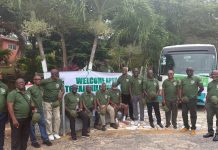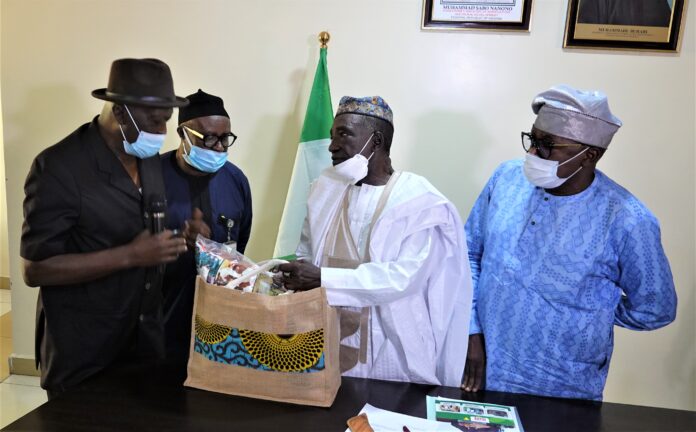Efforts to develop a cassava seed system would help Nigeria to transform cassava and meet the growing demand for cassava seeds of about N10 billion from cassava growers, experts from the International Institute of Tropical Agriculture (IITA), National Agricultural Seed Council (NASC) and National Root Crops Research Institute (NRCRI) have said.
In 2020, the Central Bank of Nigeria-midwifed program to develop cassava seed growers on 100,000 hectares across the country created a huge demand for improved and disease-free planting materials that surpassed supply.
“Last year, the demand for certified cassava stems from cassava growers was estimated at N 10 billion. Unfortunately, this opportunity was not fully taken by farmers as it was difficult to get certified stems of improved varieties,” Dr Alfred Dixon, IITA Director for Development & Delivery who led a delegation of experts said during a courtesy visit to the Honorable Minister of Agriculture and Rural Development (FMARD), Alhaji Muhammad Sabo Nanono, in Abuja recently.
The courtesy visit, which was coordinated in the framework of the IITA-managed project known as the Building an Economically Sustainable Integrated Cassava Seed System, phase 2, (BASICS-II); provided opportunity for experts to draw attention of high-level decision makers to the untapped opportunity that cassava seed system offers in terms of food security, jobs and income generation.
Dr Dixon noted that IITA through the BASICS-II project was already working with partners and farmers to tap the opportunity, explaining that the Project was creating a formal seed system for cassava that links breeder seeds with foundation seed producers and foundation seed producers to commercial seed entrepreneurs.
“The commercial seed producers will thereafter sell to the cassava root producers…and cassava root producers will subsequently process into various end products or sell surplus roots to processing industries in the Country. In this fashion, we will be creating jobs and income generation opportunities for young people that will serve as seed entrepreneurs and modern producers of cassava. Furthermore, the use of certified seeds will increase the national productivity of cassava,” he added.
Dr Dixon also called on the Federal Government of Nigeria to support the IITA GoSeeds and NRCRI Umudike Seed—two Early Generation seeds companies that are imperative for sustainable seed production that will feed the demand pool for commercial seed producers.
He made a strong case for greater collaboration between FMARD and IITA and national partners – NASC and NRCRI, and called on the government to scale out the BASICS-II project model to other cassava growing States as currently the project is working in Benue, Kogi, Abia, Akwa Ibom, Oyo and Delta States.
“Thirdly, we are appealing that the government should ensure that only certified seeds by NASC are procured from the Commercial Seeds Entrepreneurs. Lastly, you may recall the great contributions of IITA in the previous Presidential Initiatives on Cassava where we formed National consortia that successfully prevented the entrance of the devastating Uganda variant of the Cassava Mosaic Disease into the Country. Also, the last Agricultural Transformation Agenda was stimulated with IITA, NRCRI and partners’ research outputs. We want to support you by continuing to play a higher and pivotal role by becoming the technical hub for FMARD for cassava innovations that could also be scaled to other clonally propagated crops in Nigeria” he added.
The Executive Director, NRCRI, Prof Ukpabi Joseph Ukpabi, said the collaboration with IITA had been beneficial to the country, adding that the partnership made Nigeria the largest producer of cassava.
Similarly, the Director General, NASC, Dr Philip Ojo said the collaboration with IITA especially through the BASICS-II project was helping in the certification of seeds, making Nigeria a reference point to other nations for quality seed certification and regulation.
In his response, Alhaji Nanono pledged the commitment of the government to support cassava seeds sector owing to its strategic importance as a food security crop and an income earner.
He called for the involvement of the private sector in the cassava value chain, adding that it would create the much-needed jobs and wealth to transform the economy.
“As a ministry, we want to support the private sector for sustainability,” Alhaji Nanono stressed.
According to him, the ministry will continue to create appropriate policy measures for successful production and distribution of cassava product to ensure availability of food and raw materials for industries.
Members of the delegation were Prof Ukpabi Joseph Ukpabi, Executive Director, National Root Crops Research Institute, Umudike; the Director General, National Agricultural Seed Council, Dr Philip Ojo; Project Manager, BASICS-II, Prof Lateef Sanni; IITA GoSeed Manager, Dr Mercy Diebiru-Ojo; Project Manager, NextGen Cassava Project, Prof Chiedozie Egesi; Project Administrator, Ezinne Ibe; and Advocacy, Promotion & Outreach Lead, Godwin Atser. END
For more information, please contact: Godwin Atser, Advocacy, Promotion and Outreach Lead, IITA, g.atser@cgiar.org








































